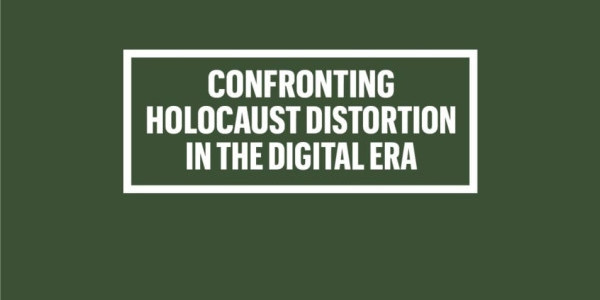Conference Wrap-Up: “Confronting Holocaust Distortion in the Digital Era” a Resounding Success!
18/11/2025 | Na stronie od 25/11/2025

Źródło: POLIN, GEOP
We are delighted to announce that the international conference “Confronting Holocaust Distortion in the Digital Era” successfully wrapped up on Thursday, November 20, following three days of vital discussion and collaboration at POLIN Museum in Warsaw.
The conference brought together a distinguished assembly of scholars, educators, and museum professionals from around the globe to address the urgent and growing challenge of Holocaust distortion in modern digital spaces.
Key Themes and Discussions
The conference served as a crucial platform to not only diagnose the problem of digital Holocaust distortion and denial but also to actively develop strategies to counter these false narratives, with a special focus on the role of social media, algorithms, and Artificial Intelligence (AI) tools.
Sessions highlighted scientific approaches, including the use of sociolinguistic analysis and the mapping of Holocaust diaries to confront AI-generated distortion. Panels critically examined the role of manipulation in education, how political rhetoric weaponizes Holocaust memory across different countries (including Argentina and China), and the profound ethical challenges posed by AI in translating, preserving, and representing Holocaust testimony, such as that of Anne Frank.
The final day brought into focus the critical work being done by institutions like the United States Holocaust Memorial Museum (USHMM), detailing their efforts in recognizing and combating distortion in Generative AI and improving the accessibility of digital collections.
Developing Counter-Strategies
The exchange of knowledge and development of practical solutions over the three days has laid a strong foundation for future initiatives. The insights gained from the lectures, panel discussions, and roundtables will be instrumental in formulating effective educational tools and policy recommendations to safeguard historical truth in the digital age.
We extend our sincere gratitude to all the sponsors, speakers, chairs, steering committee members, and attendees for making this conference an outstanding success and a pivotal moment in the ongoing efforts to confront this critical issue.
Check out the program
From November 18–20, 2025, the international conference "Confronting Holocaust Distortion in the Digital Era" will bring together scholars, educators, and museum professionals to examine the growing phenomenon of Holocaust distortion in digital spaces.
Day one focuses on Polish perspectives, scientific approaches, and a roundtable on the evolution of Holocaust discourse in Poland. Subsequent sessions explore manipulation, education, political rhetoric, and ethical challenges posed by artificial intelligence. Special attention will be given to the role of social media, algorithms, and AI tools in spreading false narratives.
The program includes lectures, panel discussions, roundtables, and public events. The conference aims not only to diagnose the problem but also to develop strategies to counter digital forms of Holocaust denial and distortion.
Program
- DAY 1 (November 18, 2025)
- DAY 2 (November 19, 2025)
- DAY 3 (November 20, 2025)
- See the program in PDF format
Steering committee:
- Jordanna Gessler (Holocaust Museum LA)
- Dr. Agnieszka Haska (Polish Center for Holocaust Research)
- Prof. Andrea Löw (Leibniz Institute of Contemporary History)
- Dr. Zachary Mazur (POLIN Museum)
- Prof. Antony Polonsky (Brandeis University)
- Hannah Randall (Holocaust Centre North, University of Huddersfield)
- Dr. Robert Rozett (Yad Vashem)
- Dr. Michał Trębacz (Jewish Historical Institute)